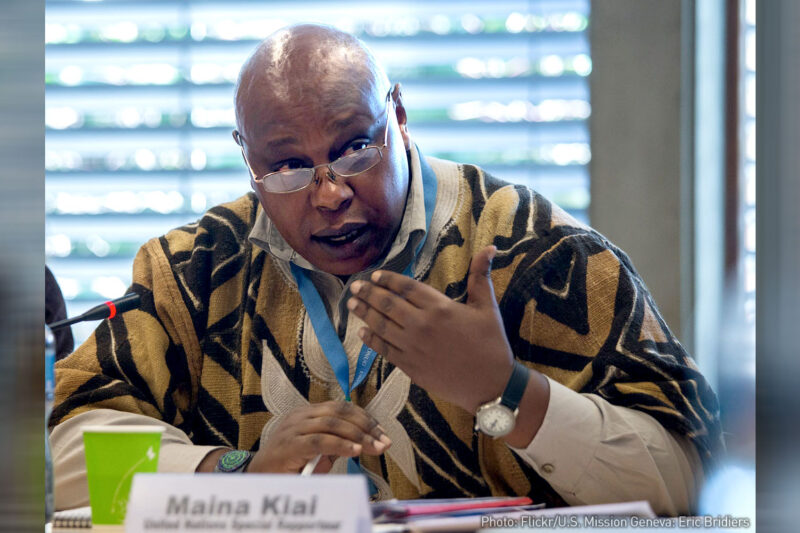UN Human Rights Expert to Visit Baton Rouge, Ferguson, and Convention Host Cities


In the first visit of its kind, the United Nations special rapporteur on the rights to freedom of peaceful assembly and of association began a across the U.S. to monitor the status and protection of assembly and association rights in our country. With much of the nation in angst about impending protests at political conventions and deadly police shootings, the special rapporteur will undoubtedly have his hands full.
Maina Kiai, a Kenyan lawyer and renowned international human rights expert, was appointed as the U.N.’s special rapporteur in 2011 following strong advocacy by the . His mission to the United States will culminate in a report that will be presented to the next year and will address gaps in First Amendment protections between U.S. law and policy and international standards.
The report will be an important test of the United States’ reputation and self-perception as a human rights champion. Ever since protests erupted in Ferguson, Missouri, the U.S. has been under international scrutiny because of its failure to hold police accountable for the killing of unarmed Black men and the use of excessive police force against protesters. Kiai’s visit comes at a time when local police departments across the country are gearing up for further confrontation with protesters, especially after five Dallas police officers were killed during a nonviolent protest against the fatal police shooting of Alton Sterling and Philando Castile.
The use of force by police facing protesters has raised national concern. Some police departments are considering more heavy-handed tactics, including dispatching sniper teams alongside marches. Mass arrests against protesters have become increasingly prevalent nationwide with at least in New York, Chicago, St. Paul, and Baton Rouge last week.
Developments in Baton Rouge are of particular importance to Kiai, whose original travel schedule to Louisiana only included a visit to New Orleans. After and eyewitness accounts brought to light the militarization and illegal use of police force on protesters in Baton Rouge last weekend, the special rapporteur scheduled meetings with community members to explore the many human rights violations that transpired.
The U.N. expert will meet with several civil society representatives, including from Black Lives Matter, Communities United for Police Reform, and other advocacy groups, as well government and law enforcement officials at the federal, state, and local levels. In addition to Baton Rouge and New Orleans, he will visit Baltimore, Ferguson, Jackson, New York City, Phoenix, and Washington, D.C. Mr. Kiai also plans to observe protests planned during the Republican National Convention and Democratic National Convention in and , respectively.
The meetings will focus on a number of themes impacting the right to peaceful assembly and association: (including the use of force), the enforcement of U.S. counter-terrorism policy (including government surveillance against minority communities), and anti-union activity against workers (including migrant workers).
Coinciding with the rapporteur’s mandate, ŔĎ°ÄĂĹżŞ˝±˝áąű affiliates have had tremendous success defending the right to peaceful assembly for grassroots organizations. The ŔĎ°ÄĂĹżŞ˝±˝áąű of Ohio challenged a set of protest restrictions passed by the city of Cleveland in that essentially sequestered protesters into small security zones and prohibited the use of everyday materials like water bottles. The court ruled that city officials must sharpen their justification for speech restrictions, rather than invoking vague “national security” concerns to abridge free speech.
Similarly, the ŔĎ°ÄĂĹżŞ˝±˝áąű of Pennsylvania filed a lawsuit on behalf of the Poor People’s Economic Human Rights Campaign after the social justice coalition was denied a permit to march during the DNC. On July 1, the ŔĎ°ÄĂĹżŞ˝±˝áąű of Pennsylvania announced that the city agreed to reverse its earlier permit denial and granted the PPEHRC authorization to march on a main street during the DNC.
The success of our First Amendment litigation highlights the ways in which the United States has often fallen short of not only meeting its constitutional obligations but also its international treaty obligations. The rights to freedom of peaceful assembly and of association are enshrined in the International Covenant on Civil and Political Rights, which the United States ratified in 1992. Yet, as the national conventions approach, government officials have sought to unreasonably limit protest activity under the guise of “national security concerns.” The United States should instead champion efforts to protect peoples’ fundamental right to free assembly and association and set a strong global example.
Given the tumultuous nature of our current election cycle and the volatile relationships between communities of color and the police, the freedom to gather and act collectively is even more important. In the coming weeks, the world will be paying close attention to how the U.S. treats those who exercise their right to freedom of assembly and association.
We should be a model for how government handles the right of protesters, not a cautionary tale.


